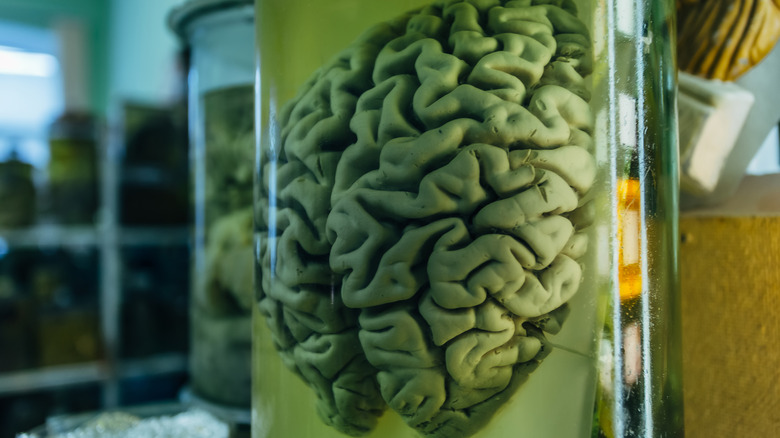Cornell Has A Brain Collection. Here's What You Should Know
You have to be pretty brainy to go to an Ivy League school. Apparently, that's even true after death: Cornell University's Wilder Brain Collection has about 70 intact human brains in residence, often those of people who led spectacular or notorious lives, according to Atlas Obscura. The collection includes the brain of suffragist Helen Hamilton Gardener, who wanted to prove a woman's brain was the same as a man's; it also includes the brain of serial killer Edward Howard Rulloff. Both of their wrinkled organs are on display for the curious and morbid.
The collection was started by a Civil War surgeon who founded Cornell's anatomy Department, Dr. Burt Green Wilder, whose own brain is now on site. At one point the collection held as many as 1,200 brains and brain fragments, though many of them eventually had to be disposed of — possibly due to poor storage (no one wants to see a gooey brain leaking everywhere).
'This is where you happen'
Today, the human brains — most of which are, startlingly, unidentified — have no real scientific use, according to what Cornell professor Barbara L. Finlay told The New York Times. But they do have a philosophical one. "The students who come in here and pass by the display cabinet," Finlay said, "are forced to confront the brain. This is the thing. This is where you happen. I want them to confront the question, 'Is there something else or not?'"
Wilder was convinced that the brains explained everything — that you could tell the difference between a brilliant scholar and a notorious criminal just by looking at the differences in their gray matter. He was mostly wrong. Today neuroscientists believe sociopaths may have lower activity in their orbital cortex (via NPR), but that's shown through scans of live brains, not preserved dead ones.
If you visit Cornell's Ithaca Campus, you can see the brain collection for yourself. The brains of Wilder, Gardener, and Rulloff are all on display alongside five others: Edward Titchener, the psychologist who coined the word "empathy"; Henry A. Ward, a naturalist; Jeremiah Jenks, an economist; Sutherland Simpson, a physiologist; and Simon Henry Gage, an anatomy professor (via Ithacating).

